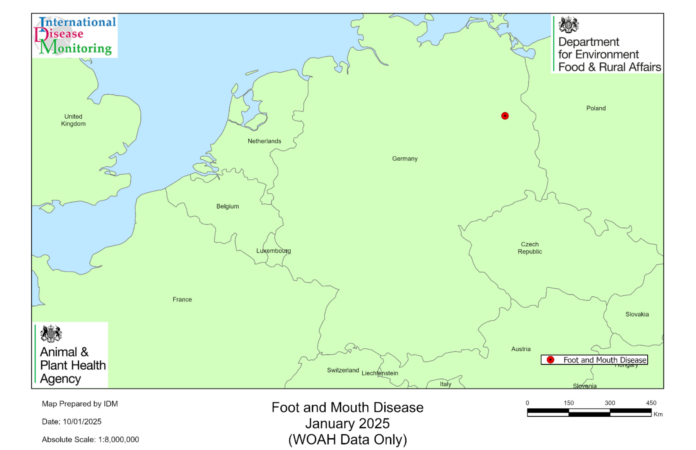The Animal and Plant Health Agency (APHA) has recently raised the risk level for the potential incursion of foot-and-mouth disease (FMD) into the UK to ‘medium’. This decision was made following the discovery of the virus in water buffalo in Germany. APHA expressed great concern over the detection of FMD virus serotype-O in Europe, particularly in a region without vaccination coverage. They emphasized the need for continued vigilance due to the significant and unexpected jumps the virus can make, often facilitated by trade and movements of people, animals, and animal products.
The current situation in Germany has raised questions about how the disease reached the country, the number of affected premises, and whether the virus has spread to local wildlife such as wild boar or deer. Given the multiple pathways for FMDV to spread, APHA has determined an increase in the risk of FMD incursion to the UK, leading to the elevation of the risk level to medium during this period of uncertainty.
In response to the outbreak in Germany, the UK government imposed a ban on the import of cattle, pigs, and sheep, along with their products, from Germany. Health certificates will no longer be issued for animals susceptible to FMD, including live animals, fresh meat, and animal products. APHA confirmed that there have been no imports of live susceptible animals from Germany in the past two incubation periods since December 12. However, the agency highlighted the ongoing risk of illegal trade in live animals from affected areas and the importance of tracing and restricting further consignments from Germany.
Additionally, APHA emphasized the need for heightened vigilance in neighboring countries due to the close connections with Germany, including large movements of workers, tourists, and refugees. Maintaining strict biosecurity measures for vehicles, equipment, and workers visiting livestock premises is crucial to prevent the spread of the virus. While the FMD outbreak in Germany is located over 800km away, there is no current risk to the UK from airborne transmission.
Control measures in Germany include restrictions on susceptible animal movements, a cull around infected premises, and the suspension of export health certificates. Suitable vaccines against FMD are available in the German FMD antigen bank, with the ability to produce necessary vaccines within a few days. Testing of cloven-hoofed animals in the vicinity of the affected farm is underway to determine the extent of the outbreak and inform further control measures.
Neighboring European countries, such as the Netherlands, are also on high alert for the disease. The Netherlands implemented a national ban on the movement of veal calves and visitors to veal farms after transporting calves from Brandenburg to the Netherlands. Germany’s actions have prompted export bans on meat and dairy products to non-EU destinations, affecting trade with the UK and other countries.
In conclusion, the recent outbreak of FMD in Germany has led to increased vigilance and control measures in the UK and other European countries. The situation highlights the importance of strict biosecurity measures, traceability of imports, and collaboration between nations to prevent the spread of infectious diseases like FMD. Ongoing monitoring and response efforts are essential to protect animal health, farming livelihoods, and international trade in the face of disease outbreaks.

